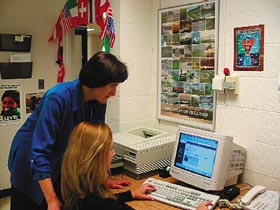|
This is an archived article.
For the latest news, go to the
Advance Homepage For more archives, go to the Advance Archive/Search Page. | ||
|
WebCT Helps Social Work Students
Gain Global Perspective By Sherry Fisher
The Center has been using the online course management tool since last year to communicate internationally through discussion lists, e-mails and video presentations.
The Center, part of the School of Social Work, promotes and supports student and faculty interest in international social work through international curriculum development, faculty exchanges, international field placements for students, and cross-national research. It emphasizes a global perspective to social workers' practice, both in their own communities and internationally. First-Hand Information
"I'm always looking for ways to promote international learning," says Lynne Healy, the Center's director, who has used the technology in collaboration with the University of the West Indies in Jamaica. "Using technology is one way to bring international content and perspectives alive for students," she says. "Instead of just reading about social issues in other countries, they can talk directly to practitioners and experts over the Internet using WebCT." Tom Felke, a May 2002 graduate of the School of Social Work who assists with instructional technology at the School, was instrumental in coordinating the technology while he was still a student. He initiated a WebCT collaboration with the University of the West Indies, and Healy began using it in a course she teaches on International Issues in Social Work. "Why not give students the ability to find out what it's like to be in a developing country, by hearing from people first hand, rather than trying to decipher information from a journal article or a chapter in a book?" questions Felke. Cari Carter, a graduate student in social work, agrees. Last year, a professor at the University of the West Indies presented a case study to the class about a community in Jamaica. "WebCT brought the case study to life," says Carter. "If I had read it in a book, I probably wouldn't have remembered it." Healy and Felke have been recognized for their work by the Council on Social Work Education through a small grant from the Silberman Fund. Felke says the Council on Social Work Education has indicated that one of the major focuses in the next round of accreditation will be the internationalizing of the social work curriculum. Understanding Local Cultures
In Connecticut, for example, there are large Caribbean, Hispanic, and Armenian populations. It is helpful for social workers here to talk directly to people in other countries who understand the local culture, and WebCT offers that, he says. When Peter Petrella, who teaches a course on computer applications in the human services at the School of Social Work, heard that a similar course was being taught at the University of the West Indies in Trinidad and Tobago, he thought they might find some of his work useful. "I put a PowerPoint presentation with audio on WebCT and they used it as part of their course," he says. "Our students and the students in the West Indies were able to discuss technology and social work and the different advancements in the field." Professionals from the University of Botswana and Cape Verde Island have also been brought to UConn's classrooms through WebCT and, starting in the spring, the program will expand to Yerevan State University in Armenia. Felke says the venture with Armenia will strengthen the linkage the School of Social Work already has, as well as the development of social work policy and practice there. |
 tudents and faculty at the
Center for International Social Work Studies don't have to
leave their seats to discuss issues with professionals from around
the globe, thanks to WebCT.
tudents and faculty at the
Center for International Social Work Studies don't have to
leave their seats to discuss issues with professionals from around
the globe, thanks to WebCT.
